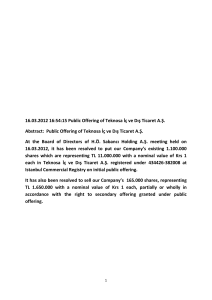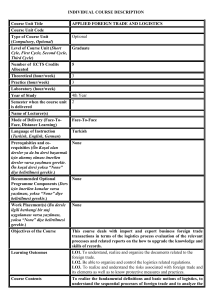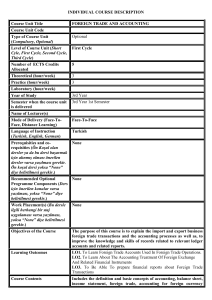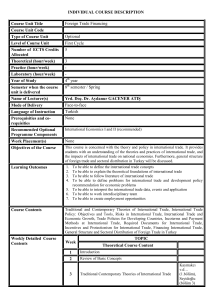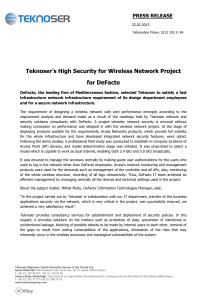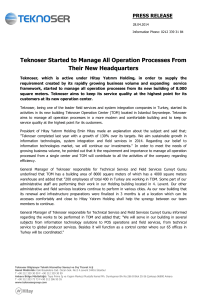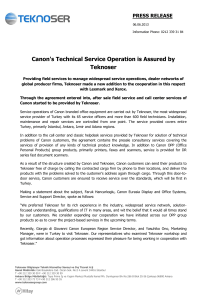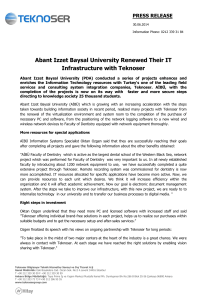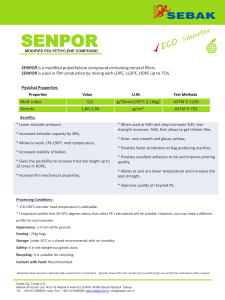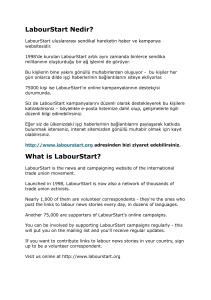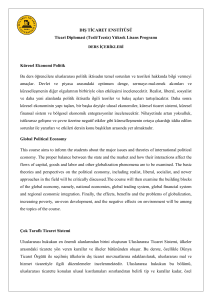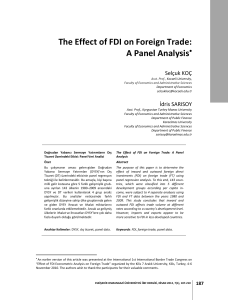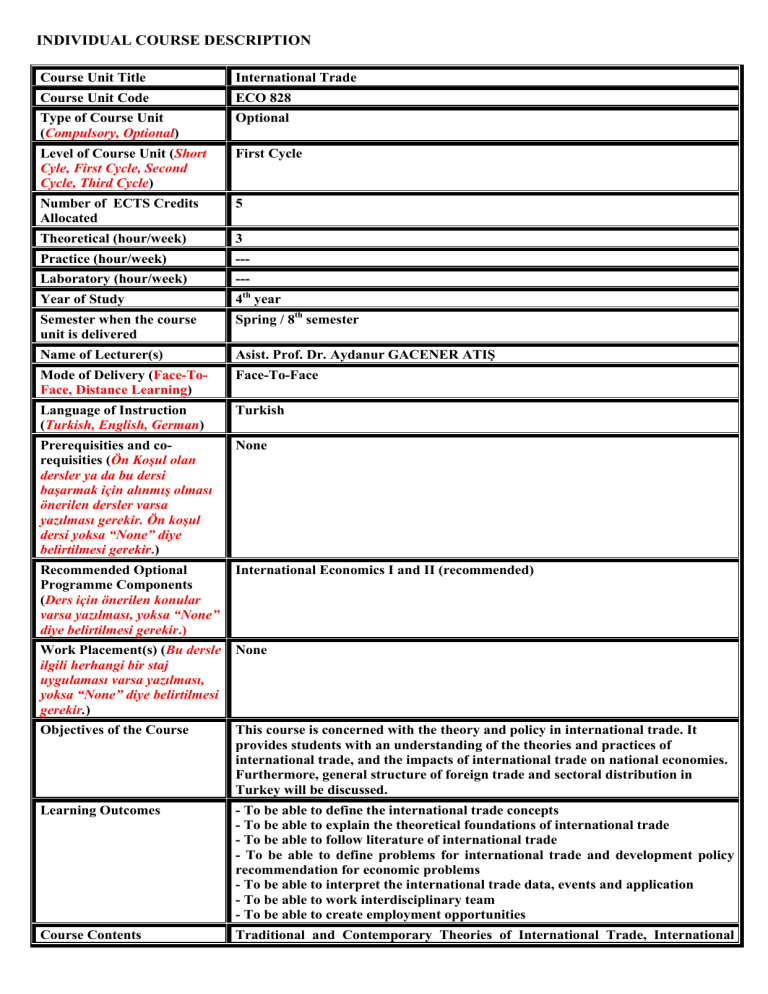
INDIVIDUAL COURSE DESCRIPTION
Course Unit Title
International Trade
Course Unit Code
ECO 828
Type of Course Unit
(Compulsory, Optional)
Optional
Level of Course Unit (Short
Cyle, First Cycle, Second
Cycle, Third Cycle)
First Cycle
Number of ECTS Credits
Allocated
5
Theoretical (hour/week)
3
Practice (hour/week)
---
Laboratory (hour/week)
---
Year of Study
4th year
Semester when the course
unit is delivered
Spring / 8th semester
Name of Lecturer(s)
Asist. Prof. Dr. Aydanur GACENER ATIŞ
Mode of Delivery (Face-ToFace, Distance Learning)
Face-To-Face
Language of Instruction
(Turkish, English, German)
Turkish
Prerequisities and corequisities (Ön Koşul olan
dersler ya da bu dersi
başarmak için alınmış olması
önerilen dersler varsa
yazılması gerekir. Ön koşul
dersi yoksa “None” diye
belirtilmesi gerekir.)
None
Recommended Optional
Programme Components
(Ders için önerilen konular
varsa yazılması, yoksa “None”
diye belirtilmesi gerekir.)
International Economics I and II (recommended)
Work Placement(s) (Bu dersle
ilgili herhangi bir staj
uygulaması varsa yazılması,
yoksa “None” diye belirtilmesi
gerekir.)
None
Objectives of the Course
This course is concerned with the theory and policy in international trade. It
provides students with an understanding of the theories and practices of
international trade, and the impacts of international trade on national economies.
Furthermore, general structure of foreign trade and sectoral distribution in
Turkey will be discussed.
Learning Outcomes
- To be able to define the international trade concepts
- To be able to explain the theoretical foundations of international trade
- To be able to follow literature of international trade
- To be able to define problems for international trade and development policy
recommendation for economic problems
- To be able to interpret the international trade data, events and application
- To be able to work interdisciplinary team
- To be able to create employment opportunities
Course Contents
Traditional and Contemporary Theories of International Trade, International
Trade Policy: Objectives and Tools, Risks in International Trade, International
Trade and Economic Growth, Trade Policies for Developing Countries, Incoterms
and Payment Methods at International Trade, Required Documents for
International Trade, Incentives and Protectionism for International Trade,
Financing International Trade, General Structure and Sectoral Distribution of
Foreign Trade in Turkey
Weekly Detailed Course
Contents (yarıyıllık dersler
için arasınav ve final sınavları
dahil edilerek 16 haftalık,
yıllık dersler için arasınav ve
final sınavları dahil edilerek
30 haftalık)
Recommended or Required
Reading
TOPIC
Week
Theoretical Course Content
Application
1
Introduction
2
Review of Basic Concepts
3
Kaymakcı
Traditional Contemporary Theories of International v.d… (part 1),
Seyidoğlu
Trade
(part 3)
4
Contemporary Theories of International Trade
Kaymakcı
v.d… (part 1),
Seyidoğlu
(part 3)
5
International Trade Policy: Objectives and Tools
Kaymakcı
v.d… (part 2),
Seyidoğlu
(part 5, 6, 7)
6
International Trade and Economic Growth
Trade Policies for Developing Countries
Kaymakcı
v.d… (part 2),
Seyidoğlu
(part 17,18)
7
Midterm Exam
8
Incentives and Protectionism for International Trade
Risks in International Trade
Kaymakcı
v.d… (part 3)
9
Financing International Trade
Kaymakcı
v.d… (part 3),
Kaya (part 2)
10
Incoterms and Payment Methods at International Trade
Required Documents for International Trade
Kaymakcı
v.d… (part 3),
Kaya (part 1)
11
Export and Import Transactions
Kaya (part 1)
12
Foreign Exchange Regulations
Kaya (part 1)
13
Customs Regimes
Kaya (part 1)
14
Grant in Aid for International Trade
Kaya (part 1)
15
General Structure and Sectoral Distribution of Foreign
Trade in Turkey
Tokgöz
(2009),
Coşkun
(2009) e.t.c….
16
Final Exam
1. Kaymakcı O., Avcı N., Şen R. (2007), Uluslararası Ticarete Giriş, Nobel
Yayın Dağıtım, Ankara.
2. Kaya F. (2009), Dış Ticaret ve Finansmanı, Beta Yayınları, 1. Bası, İstanbul.
3. Ünsal E. (2005), Uluslararası İktisat: Teori, Politika ve Açık Ekonomi Makro
İktisadı, İmaj Yayıncılık, Ankara.
4. Seyidoğlu H. (2009), Uluslararası İktisat Teori Politika ve Uygulama, Güzem
Can Yayınları, Geliştirilmiş 17.Baskı, İstanbul.
5. Utkulu U., Özken A., Aydemir İ., Yılmaz M. (2008), Türkiye’de Dış Ticaret
İşlemleri ve Uygulaması, Gazi Kitabevi, Ankara.
6. Melemen M., Arzova B. (2000), Uluslararası Ticaret, Alternatif Finansman
7.
8.
9.
10.
11.
12.
13.
14.
15.
16.
Teknikleri, Ticari Yazışma Örnekleri, Türkmen Kitabevi.
Yeni C. (2005), Uluslararası Ticarette Ödeme Yöntemleri, Alfa Basım Yayım
Dağıtım, İstanbul.
Gürsoy Y. (2009), Dış Ticaret İşlemleri Yönetimi, Ekin Kitabevi, Bursa.
Bora Ö., Köksal T. (2009), Adalet Yayınevi, Ankara.
Elele O. (2008), Uluslararası Ticarette Damping ve Antidamping, Yaklaşım
Yayıncılık, Ankara.
Kaya S. (2007), Her Yönüyle Dış Ticaret, Seçkin Yayınevi, Ankara.
Tokgöz E.(2009), Türkiye’nin İktisadi Gelişme Tarihi (1914-2009), İmaj
Yayınevi, 9.Bası, Ankara.
Coşkun N. (2009), Türkiye Ekonomisi Yeni Yapı (2000-2008), İmaj Yayınevi,
Ankara.
Krugman P., Obstfeld M. (2003), International Economics, Addison Wesley,
6.Baskı, Boston.
Marrewijk C. (2004), International Trade and The World Economy, Oxford
University Pres.
Feenstra R.C. (2004), Advanced International Trade:Theory and Evidence,
Princeton University Pres.
ASSESSMENT
Term (or Year) Learning Activities
Weight, %
Midterm Exam
100
TOTAL
100
Contribution of Term (Year) Learning Activities to Success Grade
40
Contribution of Final Exam to Success Grade
60
TOTAL
100
Planned Learning Activities, Teaching Methods, Evaluation Methods and Student Workload
Activities
Quantity
Duration
(hour)
Total Work Load
(hour)
16
3
48
7
2
14
Project
8
2
16
Homework Assignments
8
1
8
Mid-Terms
a)Exam
b) Student’s preparation
1
10
2
2
2
20
Final
a)Exam
b) Student’s preparation
1
20
2
2
2
40
TOTAL
71
16
150
Course hours
Lab
Application
Special Course Internship
Field Work
Study hours out of class
Presentations/ Seminar
ECTS Credits
150/30=5 ECTS
Contribution of Learning Outcomes to Programme Outcomes*
Programme Outcomes
Learning
Outcomes
LO1
PO
1
PO
2
PO
3
PO
4
PO
5
PO
6
PO
7
PO
8
PO
9
PO
10
PO
11
PO
12
4
PO
13
PO
14
PO
15
PO
16
PO
18
PO
19
4
LO2
4
LO3
4
LO4
4
LO5
5
3
3
3
LO6
LO7
PO
17
4
3
5
LO8
*Contribution Level:
4
1 Very Low
2 Low
3 Medium
4 High
5 Very High

